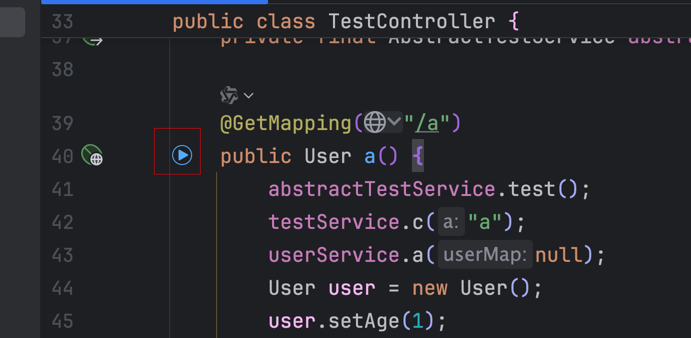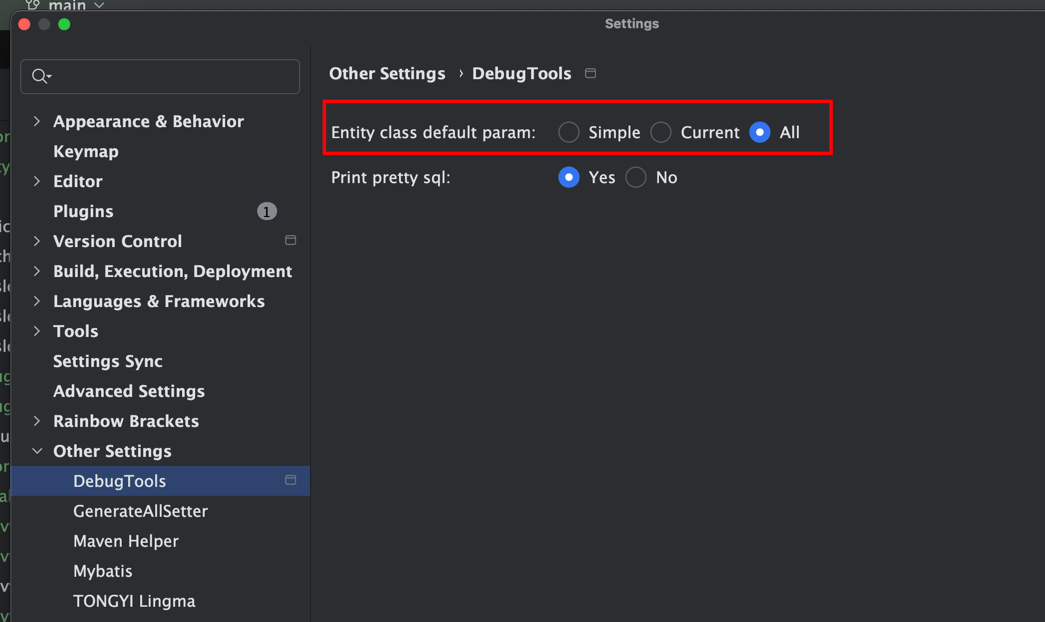调试面板
- 在要调用的方法上唤醒右键菜单,点击
Quick Debug唤醒 调试面板。

- 鼠标放在要调用的方法行头,也可以唤醒 调试面板。


ClassLoader
要想调用方法,就需要获取其 Class信息 或 实例信息,所以需要选择调用方法的 ClassLoader ,默认选中默认类加载器。
注意
类加载器除了附着第一次获取其他都是使用的缓存,如果通过热重载等加载了其他的类,那么需要通过 Refresh 刷新类加载器。
CurrentClass
设置要调用方法所在的类,默认为鼠标所在方法的类。
CurrentMethod
设置要调用方法,默认为鼠标所在的方法。
XXL-Job Param
如果调用的方法时 xxl-job 的方法,那么可以在此处传递参数。
Header
如果需要对当前方法传递 Header 参数,可以在此处设置。
传递方法参数
DebugTools 使用 JSON 格式传递方法参数,我们称为 DebugToolsJson 。格式为:
{
"方法参数名字": {
"type": "参数类型",
"content": "参数内容"
}
}type支持类型
simple
当方法参数是简单类型时,type 为 simple,content 为具体的值。唤醒控制面板时符合的参数 type 会自动识别为 simple。
- 原始类型
- String、other CharSequence
- Number
- Date
- URI
- URL
- Locale
- Class
转换方式
spring环境下:- Date:格式化
yyyy-MM-dd HH:mm:ss的字符串 - LocalDateTime:格式化
yyyy-MM-dd HH:mm:ss的字符串 - LocalDate:格式化
yyyy-MM-dd的字符串 - LocalTime:格式化
HH:mm:ss的字符串 - 其他情况:通过
org.springframework.beans.SimpleTypeConverter的convertIfNecessary方法转换
- Date:格式化
非spring环境下:- Date:格式化
yyyy-MM-dd HH:mm:ss的字符串 - LocalDateTime:格式化
yyyy-MM-dd HH:mm:ss的字符串 - LocalDate:格式化
yyyy-MM-dd的字符串 - LocalTime:格式化
HH:mm:ss的字符串 - 其他情况:通过
cn.hutool.core.convert.Convert的convert方法转换
- Date:格式化
enum
当方法参数是枚举类型时,type 为 enum,content 为枚举的 name 信息。唤醒控制面板时参数如果是 enum 时 type 会自动识别为 enum。
转换方式
content 中需要填入对应枚举的 name 进行转换,使用 Enum.valueOf() 方法
示例
枚举值如下
public enum TestEnum {
YES(1, "是"),
NO(0, "否");
private final int code;
private final String desc;
public TestEnum(int code, String desc) {
}
}
// 方法为
public void test(TestEnum testEnum) {
}如要传递给 test 方法的 testEnum 参数传入 YES
{
"testEnum": {
"type": "enum",
"content": "YES"
}
}json_entity
DebugTools 通过 content 中的信息以 JSON 格式给 Java 实体对象赋值。
唤醒控制面板时参数如果符合时 type 会自动识别为 json_entity。
识别方式
- 数组类型
- 非其他特殊类型的实体
示例
要传递的java实体如下:
public class TestDTO {
private String name;
private Integer age;
}要调用的方法如下:
public class TestService {
public void test(TestDTO testDTO) {
}
}调用方法时传入参数:
{
"testDTO" : {
"type": "json_entity",
"content": {
"name": "DebugTools",
"age": 3
}
}
}lambda
DebugTools 通过 lambdaFromString 将 content 中的 String 转化为 lambda 表达式。
唤醒控制面板时参数如果符合时 type 会自动识别为 lambda。
识别方式
类是 接口 并且有 java.lang.FunctionalInterface 注解
示例
要传递的 lambda 表达式如下:
package java.util.function;
import java.util.Objects;
@FunctionalInterface
public interface BiFunction<T, U, R> {
R apply(T t, U u);
}要调用的方法如下:
public class TestService {
public Integer add(BiFunction<Integer, Integer, Integer> function) {
return function.apply(1, 2);
}
}调用方法时传入参数:
{
"function" : {
"type": "lambda",
"content": "(x, y) -> x + y"
}
}bean
方法参数是 Spring Bean 类型时,type 为 bean,不需要指定 content。
唤醒控制面板时参数如果符合时 type 会自动识别为 bean。
识别方式
类是上可以获取到下面注解,直接间接都可以:
org.springframework.stereotype.Controllerorg.springframework.stereotype.Serviceorg.springframework.stereotype.Componentorg.springframework.stereotype.Repository
转换方式
- DebugTools 会通过选择的 classloader 加载方法的 Class 信息,获取到要注入 Bean 的 Class 信息。
- 优先通过 spring 上下文获取,如果有多个取第一个
- 获取不到从jvm中获取,如果有多个取第一个
- 获取不到调用构造方法创建
示例
@Service
public class TestBean1 {
}要调用的方法如下:
@Service
public class TestBean2 {
public void test(TestBean1 testBean1) {
}
}调用方法时传入参数:
{
"function" : {
"type": "bean"
}
}request
方法参数是 request 类型时,type 为 request,不需要指定 content。
唤醒控制面板时参数如果符合时 type 会自动识别为 request。
识别方式
类是 接口 并且固定为 javax.servlet.http.HttpServletRequest。
转换方式
DebugTools 通过自定义的 MockHttpServletRequest 类实现了 tomcat 的 javax.servlet.http.HttpServletRequest 接口。
如果传递了 header 信息,则使用携带 header 信息的 MockHttpServletRequest,否则创建新的 MockHttpServletRequest。
示例
调用方法接收 HttpServletRequest 参数
import javax.servlet.http.HttpServletRequest;
public class TestService {
public void test(HttpServletRequest request) {
}
}调用方法时传入参数:
{
"request" : {
"type": "request"
}
}response
方法参数是 response 类型时,type 为 response,不需要指定 content。
唤醒控制面板时参数如果符合时 type 会自动识别为 response。
识别方式
类是 接口 并且固定为 javax.servlet.http.HttpServletResponse。
转换方式
DebugTools 通过自定义的 MockHttpServletRequest 类实现了 tomcat 的 javax.servlet.http.HttpServletRequest 接口。
如果传递了 header 信息,则使用携带 header 信息的 MockHttpServletRequest,否则创建新的 MockHttpServletRequest。
示例
调用方法接收 HttpServletResponse 参数
import javax.servlet.http.HttpServletResponse;
public class TestService {
public void test(HttpServletResponse response) {
}
}调用方法时传入参数:
{
"response" : {
"type": "response"
}
}file
方法参数是 文件 类型时,type 为 file,content 为文件绝对路径。
唤醒控制面板时参数如果符合时 type 会自动识别为 file。
识别方式
- methodArgClass.isAssignableFrom(Class.class) 返回 true。
- 类是
接口并且固定为org.springframework.web.multipart.MultipartFile。
转换方式
DebugTools 通过 content 获取文件的绝对路径。
- 通过创建
File实例传入 - 如果是
MultipartFile类型则创建MockMultipartFile实例传入
示例
调用方法接收 HttpServletResponse 参数
import javax.servlet.http.HttpServletResponse;
public class TestService {
public void test(HttpServletResponse response) {
}
}调用方法时传入参数:
{
"response" : {
"type": "response"
}
}class
方法参数是 java.lang.Class 类型时,type 为 class,content 为类的全路径。
唤醒控制面板时参数如果符合时 type 会自动识别为 class。
识别方式
methodArgClass.isAssignableFrom(Class.class) 返回 true。
转换方式
DebugTools 通过 content 获取类信息,采用选择的 类加载器 获取到 class 实例传入
示例
调用方法接收 Class 参数
public class TestService {
public String test(Class<?> clz) {
return clz.getName();
}
}调用方法时传入参数:
{
"response" : {
"type": "class",
"content": "java.lang.String"
}
}快捷操作
格式转化
当前端给我们参数时,我们希望他能直接用 DebugTools 调用,但是 DebugTools 只接受 DebugToolsJson 格式,因此需要我们先将参数转化为 DebugToolsJson。
目前支持的 json、query 和 path 格式。
TIP
path 格式是通过属性顺序转换的。
实体类型仅支持 json 格式转换。
其他格式转DebugToolsJson格式
将其它格式转为DebugToolsJson时,在调试面板点击 唤醒。点击
Convert 按钮后会自动添加到调试面板。

示例
{
"name": "DebugTools",
"age": 18
}name=DebugTools&age=18/DebugTools/18{
"name": {
"type": "simple",
"content": "DebugTools"
},
"age": {
"type": "simple",
"content": 18
}
}DebugToolsJson格式转其他格式
将DebugToolsJson转为其它格式时,在调试面板点击 唤醒。点击
Copy 按钮后会复制到剪切板。

示例
{
"name": {
"type": "simple",
"content": "DebugTools"
},
"age": {
"type": "simple",
"content": 18
}
}{
"name": "DebugTools",
"age": 18
}name=DebugTools&age=18/DebugTools/18美化
在调试面板点击 会美化调试面板的DebugToolsJson。
填入DebugToolsJson
DebugTools 可以根据方法参数自动生成 DebugToolsJson,目前支持 simple、current 和 all 三种模式。
在没有运行过的时,第一次 DebugTools 会自动生成 DebugToolsJson,通过配置可以修改默认生成哪种模式。

下面例子中的 Child 类如下:
public class Parent {
private String name;
private Integer age;
}
public class Child extends Parent {
private Integer sex;
}Simple
在调试面板点击 可以生成简单的DebugToolsJson,如下:
{
"child": {
"type": "json_entity",
"content": {
}
}
}Current
在调试面板点击 可以生成当前类的DebugToolsJson,如下:
{
"child": {
"type": "json_entity",
"content": {
"sex": {
"type": "simple",
"content": 0
}
}
}
}All
在调试面板点击 可以生成当前类及所有父类属性的DebugToolsJson,如下:
{
"child": {
"type": "json_entity",
"content": {
"sex": {
"type": "simple",
"content": 0
},
"name": {
"type": "simple",
"content": ""
},
"age": {
"type": "simple",
"content": 0
}
}
}
}存储
如果参数很多,每次都输入很麻烦,调用完成之后 DebugTools 会储存这个 唯一方法 的上次请求,下次唤醒这个方法调试面板时会自动填充。
方法唯一标识生成方式
通过方法所在 类 + 方法名 + 方法参数 生成唯一标识,目前每个方法只保留最后一次请求。
DebugTools 还可以 快捷调用上一次 方法。